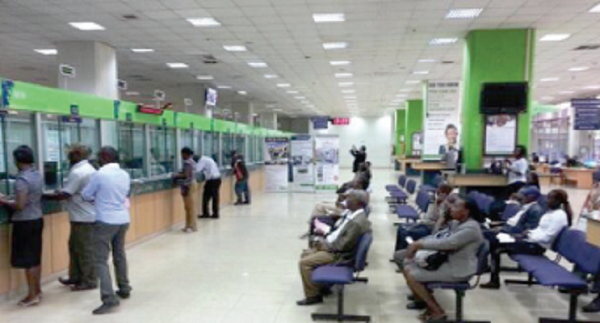
Sanitising the financial industry - the case of the banking sector and capital market in Ghana
The financial services industry in Ghana consists of a broad spectrum of players ranging from regulators of the industry and actors and services providers.
Broadly speaking, the financial sector encompasses the economic services and businesses that manage money and add value for profit and redistribute the gains with other economic activities.
In Ghana, we talk of the banking sector that is regulated by the Central Bank, insurance sector which is also regulated by the Insurance Commission and the capital market that is regulated by the Securities and Exchange Commission.
For our analysis, we shall limit ourselves to the banking sector and capital markets that are regulated by the Bank of Ghana (BoG) and Securities and Exchange Commission (SEC) respectively.
The legislations that currently regulate the banking sector and the non-banking sector are the Banks and Specialised Deposit-Taking Institutions Act, 2016 (Act 930) and Non-Bank Financial Institutions Act, 2008 (Act 774).
On the other hand, the Securities and Exchange Commission which ensures that the capital market players operate with efficiency is governed by Securities Industries Act, 2016 (Act 929), SEC Regulations, 2003 (LI 1728) and other related regulations.
The regulators of the above sectors have since the 4th Republic of Ghana been putting various reforms into the sectors to sanitise their respective market space.
For instance, we have seen the Bank of Ghana (BoG) in the recent past being on the media landscape giving directives and guidelines for both the banking and the non -banking institutions with regards to minimum capital requirements.
All these new reforms are aimed at ensuring economic growth in the sector and to bring immense economic contribution both to the banking sector and the country in general.
It is instructive to note that the recent wave that is blowing across the banking sector is because of the new reforms and measures that the BoG has put in place. Therefore, we hear of mergers and acquisition in our side of this world.
The new Banking Act - Banks and Specialised Deposit-Taking Institutions Act, 2016 (Act 930) was first tested in August 2017 when we heard of the collapse of the UT and Capital banks and their subsequent absorption by the GCB Bank. Again, this year, we first heard of UniBank’s insolvency and lastly the consolidation of the five banks.
The reforms at the Bank of Ghana are not only aimed at the universal banks which are classified as Tier 1 institutions.
There are also the non-bank financial institutions which by their nature are also functioning as the universal banks that include savings and loans companies (S&LC), Finance Houses (FH), Microfinance Institutions (MFIs) and the Micro-Credit Institutions. All these institutions are involved in either deposits-taking or granting of loans.
With the recent blues at the banking sector, one may ask who is not doing the right thing that has brought us to this quagmire of financial indiscipline? Can we say that both the regulator and the players are part to be blamed in this mess that we are experiencing?
Is that the end of this new phenomenon or there is more to come? What is happening at the other side of the divide, that is the capital market? Are we seeing the regulator cracking the whip or all is well with the Securities and Exchange Commission and its players? We need to ask these questions now so that we are not caught with pants down.
As a financial consultant, I want to share my thoughts on what is happening in these two sectors of the economy and provoke some debate or perhaps offer some recommendations that will ensure discipline and sanity in the investment and banking sector of our financial industry.
Regulating the banking sector
First, what is the role of the Bank of Ghana in regulating the banking industry? The new Act 930 states that the BoG shall have overall supervisory and regulatory authority in all matters and responsible for:
(i) promoting the safety and soundness of banks and specialised deposit-taking institutions
(ii) considering and proposing reforms
(iii) ensuring the stability and soundness of the financial system
(iv) dealing with unlawful or improper practices of the banks and specialised deposit-taking institutions.
These roles cut across for all the tiers whether deposit-taking or non-deposit taking, finance houses, savings and loans companies, microfinance institutions, micro credit and individual susu collectors.
The Bank of Ghana has also put in place supervisory bodies to overlook the Tier 1 Institutions - the Banks Supervision Department (BSD) and Tiers 1, 2, 3 & 4.
Other Financial Institution Supervision Department (OFISD), I believe these two departments were thoughtfully crafted out to deal with the institutions under them in accordance with their ability to accommodate situations when they arise.
For instance, the latter has a Business Rules and Sanctions Manual for Micro Finance Institutions (Tiers 2, 3 and 4).
In this rule book, are all the regulatory and compliance requirements that the micro finance institutions (MFIs) shall adhere to.
Failure to adhere to these rules are sanctions ranging from penal charges to revocation or withdrawal of licenses.
The Bank of Ghana in addition to their supervisory functions has introduced prudential reporting system where the institutions submit weekly, bi-weekly, monthly, quarterly, semi-annual and annual prudential financial returns to be submitted by the institution under their supervisions.
These prudential returns are to be scrutinised by the supervision departments and brought to book any institution that violates any rule, guideline or directive.